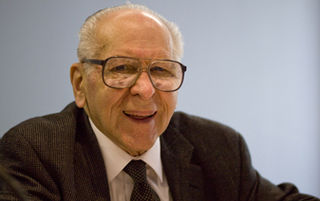Psychiatry
Szasz, Schizophrenia, and Civil Commitment
Was Szasz's position on civil commitment more nuanced than commonly believed?
Posted November 6, 2019
Thomas Szasz was a psychiatrist best known for his 1961 bestselling book The Myth of Mental Illness, in which he infamously argued that mental illness is not a genuine disease but rather a metaphor for human problems in living. Commonly grouped alongside the antipsychiatrists R.D. Laing and David Cooper, Szasz abhorred the label, insisting throughout his career that he was not anti-psychiatry but rather anti-coercive psychiatry. (His arguments, however, are frequently employed by those associated with the antipsychiatry movement.)

Szasz's nuanced career spanned a remarkable seven decades, beginning with early psychoanalytic writings on pain (his first book, Pain and Pleasure, was published in 1957 and gave little suggestion of his later critical observations). His 1965 book The Ethics of Psychoanalysis laid the framework for a psychotherapeutic approach which, in Freud's tradition, seeks to expand the patient's freedom and self-determination. Yet, the essence of Szasz's career was a libertarian crusade against the use of state power vis-à-vis psychiatry, namely the practices of involuntary civil commitment and the insanity defense.
[Readers are directed here, here, and here for my critique of Szasz's beliefs on mental illness, including a 2018 piece co-authored with Ronald W. Pies, M.D., a student of Szasz's in residency in the 1980s.]
In his public appearances and professional writings, Szasz was unwavering in his view that even severe mental disorders, like schizophrenia, are "mythical" and "metaphorical," and that to deprive someone of liberty on the basis of such a diagnosis amounts to "psychiatric slavery." Despite whisperings that Szasz was somewhat more relaxed in his position in private conversations — one such claim has been made by the former president of the American Psychiatric Association, Jeffrey Lieberman, M.D. — there is scant public evidence to suggest that Szasz ever wavered in his views regarding schizophrenia and civil commitment.
Thus, I was surprised to come across a videotaped 1983 interview in which Szasz does just that. In his discussion with Jonathan Miller in an episode of Miller's television series States of Mind, Szasz concedes that society should treat the gravely disturbed ("mad" or psychotic) person in the same way it treats the person who has been rendered unconscious by an accident, implying support for involuntary treatment in these cases. This is a rare admission for Szasz. To my knowledge, it may represent the only such statement he ever made publicly.
I have transcribed the exchange below, emphasizing the pertinent points. Readers can view the full video here. Szasz's remarks regarding society's role in treating the gravely disturbed can be found around the 33-minute mark.
Miller: What do you do about those people who, in fact, are, for reasons which we needn't discuss—either because of brain disorder or something else, some existential disorder—have become mad, and mad in a way which renders them incapable of asking for the help which, in fact, a profession might be able to give?
Szasz: What do we do about this? Well, we can have a conversation about this, obviously, and your question is, again, well-taken.… But again, let me first say, this is why psychiatry is so powerful—because it is so useful…. Now, whether it is as good a thing as we can possibly do or not is debatable. Obviously, many people think it's the best we can do, and in many situations, it may be the best thing we can do…. To the extent to which people behave that way [mad], there is no great problem, and there is no great conflict between my views and those of traditional, ordinary, regular psychiatrists. Because these persons, then, should be treated more-or-less on the model of someone who has been hit by a taxi and is unconscious. The ordinary channels of medicine, science, compassion, and humanity should be mobilized and this person should be cared for and treated in whatever way makes sense to society, scientifically and humanly. There is no great problem.
Clearly, this statement represents a significant shift from Szasz's more hard-lined rejections of involuntary treatment and should be noteworthy to historians of psychiatry and others who take an interest in Szasz's work. Szasz is, in essence, leaving the door open to the use of involuntary treatment in cases of grave disability, "madness," and "insanity" (presumably, psychosis).
Interestingly, Szasz managed to avoid work with involuntary patients in residency training and during psychoanalytic training. As a psychiatrist, he maintained a private practice for many years which was limited to voluntary patients. Thus, his clinical experience with these severe psychiatric presentations was likely limited.
In light of this 1983 conversation, were Szasz's views on involuntary commitment actually more nuanced than commonly believed? One would be hard-pressed to find such evidence in his writings. However, when pressed in an interview (and perhaps also in private conversations), Szasz seemed to acknowledge what we all know to be true: the very real and appropriate need for involuntary treatment in these rare and unfortunate situations.
Author's note: After this article was originally posted, Allen Frances, M.D., chairman of the DSM-IV Task Force, shared the piece on Twitter and commented, "At dinner with Szasz 40 years ago, I posed this tough hypothetical: 'Would you stand idly by while your psychotic son exercises his free choice to kill himself?' Tom smiled and said: 'I am a father first, and a civil libertarian second.' Szasz was more sensible than many Szaszians."




